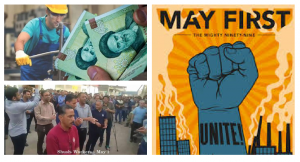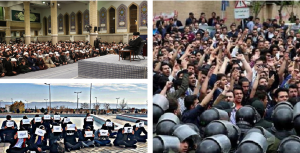(video) Leaked Files Reveal Regime Uses Policy and Media Tactics to Suppress Uprising in Iran
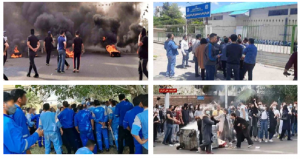
The Iranian regime has been trying to prevent protests and strikes by teachers and workers at any cost, as revealed in a leaked document obtained and published by “GhyamSarnegouni” (“Rise to Overthrow” in Persian), a group of Iranian dissidents.
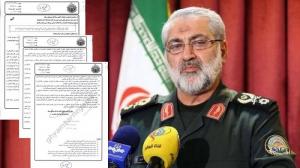
A “very confidential” letter from the regime’s Defensive Publicity Organization of the General Staff of the Armed Forces to the Secretary of the Supreme National Security Council and the commander of Imam Sadiq HQ, detailing some suggestions and requirements.
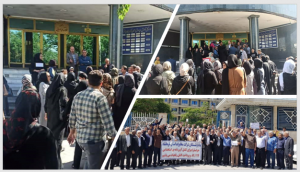
The letter refers to the “teacher’s salary ranking law” that was passed on December 15, 2020, following major nationwide protests that demanded the government to adjust teachers’ salaries according to the ever-rising inflation rates.
Letter, "Avoid making uncertain promises, raising expectations and making challenging decisions related to labor without careful consideration by officials."
The document is a “very confidential” letter from the regime’s Cultural and Defensive Publicity Organization of the General Staff of the Armed Forces to the Secretary of the Supreme National Security Council and the commander of Imam Sadiq HQ, detailing some suggestions and requirements and basic considerations related to Iran’s national Teachers’ Day and the International Worker’s Day.
While tacitly acknowledging that the ruling theocracy has no meaningful solution to the country’s social and economic crises, the letter calls for more deceptive policies, ordering state media to twist the truth and reflect the non-existing “positive actions” of Ebrahim Raisi’s government to improve teachers and workers’ livelihood.
The leaked letter also shows how much the regime is afraid of the connection between the strikes and protests of workers and teachers, desperately trying to “vigilantly prevent the formation of a network that connects workers’ and teachers’ gatherings and strikes.”
The documents, signed by the Islamic Revolutionary Guards Corps (IRGC) Brig. Gen. Abolfazl Shekarchi highlights the role of the organized opposition, or as he says, “the enemy,” by so-called “revealing their intentions to disrupt the educational system and economic centers to destabilize the country.”
The letter refers to the “teacher’s salary ranking law” that was passed on December 15, 2020, following major nationwide protests that demanded the government to adjust teachers’ salaries according to the ever-rising inflation rates that have caused a spike in the price of basic items and livelihoods.
The full translated text of this document is below:
With the recent onset of labor strikes in the oil, petrochemical, and gas mining industries, coupled with the failure to address labor demands and provide wage increases in line with purchasing power and inflation, there is a growing concern regarding potential unrest in the country.
The Coordination Council of Trade Union Organizations of Iran has alleged intentional accusations against the state, citing its refusal to implement the teachers’ salary ranking law. These circumstances present an opportunity for agitators and opposition groups to exploit the situation and create tension.
As International Workers’ Day approaches on May 1, followed by Teacher’s Day on May 2, individuals using social media and online platforms aim to encourage and motivate other workers to participate in nationwide strikes and protests. They continuously publish and share content to escalate these demonstrations.
Opponents of the system are actively seeking to network and amplify the protests, aiming to foster anger and dissatisfaction among the public regarding the system’s performance. They also attempt to connect incidents of school poisonings to intentional acts and portray students’ lives as being in danger.
Furthermore, they try to link livelihood protests with labor strikes, thereby portraying the country as being in a state of emergency. These actions are part of a larger strategy in the current situation, employing psychological operations and media measures in the realm of soft warfare.
To address this situation effectively, the following suggestions, requirements, and considerations should be considered:
• Protecting the mental well-being of the working community and teachers, reducing the psychological and cognitive impact caused by social media, external influences, and internal adversaries.
• Creating a logical and rational interactive environment devoid of negative emotions when addressing the demands of teachers and workers, utilizing the country’s media capabilities.
• Providing necessary information, support, and assistance to influential educational and labor figures.
• Vigilantly preventing the formation of a network that connects workers’ and teachers’ gatherings and strikes.
• Avoid making uncertain promises, raising expectations, and making challenging decisions related to education and labor without careful consideration by relevant officials.
• Implementing coordinated and synergistic communication policies to effectively convey news updates regarding labor and teaching developments and related decisions.
• Generating positive and promising content, along with clear step-by-step explanations of the actions taken by President Raisi’s government to address the main concerns and issues faced by teachers and workers.
• Leveraging media to create a positive and hopeful atmosphere among teachers and workers by highlighting the government’s constructive actions.
• Fostering a positive sentiment among teachers and workers within the intellectual and cultural system of the working community, emphasizing the interaction and acknowledgment of the government’s programs aimed at improving their situations through media and virtual platforms.
• Promoting and honoring the culture and dignity of teachers and workers as both religious and national values.
• Emphasizing the social commitment of teachers and workers to revolutionary and national religious ideals, showcasing their dedication to Iranian Islamic patterns and norms.
• Establishing a sense of equality between teachers, workers, and officials through untainted interactions and highlighting these interactions in the media.
• Promoting and emphasizing the spiritual value of education and the role of teachers within religious and national culture, actively showcasing these aspects in the media and virtual spaces.
• Prioritizing the dissemination of positive and pleasant news related to the rights and benefits of teachers and workers through various media channels and online platforms.
• Highlighting the government’s support for educational researchers and labor innovators in the media and virtual spaces.
• Showcasing the crucial role of teachers in nurturing the self-esteem and scientific capabilities of the younger generation, contributing to the country’s progress and excellence.
• Producing content and artistic documentation that highlights the prominent role of teachers in the education sector and workers in the fields of science, production, and the economy, particularly in the face of challenging conditions imposed by foreign sanctions. Publishing and sharing this content through media outlets.
• Respecting the understanding of teachers and workers and enhancing their participation in resolving issues that affect them, expanding interactive spaces, and fostering empathy and patience in this regard.
• Exposing the ulterior motives of opponents and agents associated with global arrogance by revealing their intentions to disrupt the educational system and economic centers to destabilize the country.
• Discrediting the coordinated media network affiliated with the Global Arrogance and the anti-revolutionary front by exposing their manipulative tactics and contradictory narratives through the presentation of authenticated evidence.
• Delegitimizing activists and governments that support riots and insecurity in Iran by leveraging the expertise of professionals, preferably teachers, and workers, in the media and virtual spaces.
• Instilling disappointment and disillusionment among the opponents of the anti-regime front, who attempt to rally teachers and workers by showcasing the pivotal role played by these two groups in the fields of science and production.
• Highlighting the existing differences among different opposition factions, stemming from their reliance on foreign governments and their failure to deliver on projects such as the “Charter of Solidarity.”
• Identifying and addressing the administrators of channels and social groups that promote labor strikes and protests within social networks and virtual spaces.
• Summoning key labor and teacher leaders for explanatory and justifying meetings with relevant officials from the Ministry of Education and the Ministry of Labor and Social Welfare. Utilize incentive policies to encourage those who have been neglected to re-engage with the system and issue necessary warnings to those who persist in engaging in destructive behavior.
By adhering to these suggestions, requirements, and considerations, it is possible to mitigate the impact of external influences and internal unrest while facilitating effective communication and addressing the concerns of teachers and workers.
Shahin Gobadi
NCRI
+33 6 61 65 32 31
email us here
Facts from Behind the Scenes: Iranian Resistance exposes IRGC's dominance on Iran's mining industry
Legal Disclaimer:
EIN Presswire provides this news content "as is" without warranty of any kind. We do not accept any responsibility or liability for the accuracy, content, images, videos, licenses, completeness, legality, or reliability of the information contained in this article. If you have any complaints or copyright issues related to this article, kindly contact the author above.

